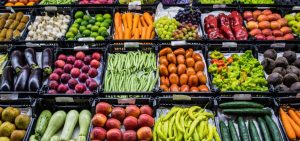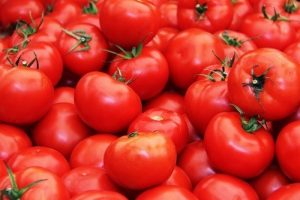
What is seasonal food? Seasonal food is produce that is purchased and consumed around the time that it is harvested. Seasonal eating includes eating fresh fruits and vegetables that haven’t been processed chemically or transported long distances. Processing foods includes things such as tinning, blanching and dehydrating foods to enhance their life span.
For example, during Monsoon our body becomes vulnerable to waterborne infections and diseases. Hence our health takes a toll. Fruits and vegetables like pumpkins, broccoli, spinach, lettuce, sweet potatoes, corn, eggplant, cauliflower, cranberries, blueberries, apples, beets, ginger, garlic, Brussel sprouts etc. are good during this season. Corn, gram flour and chick peas are considered drying foods and are better to eat during the rainy season. Herbal teas are a nice and healthy way to stay warm during the rains. Hot soups are also a good idea; you can even add some garlic to your soup so that it can improve immunity.
In winter, the most warming vegetables that are good for our body are root vegetables like carrot, potato, onions, garlic, radish, yams, sweet potatoes, beets, turnips, etc, and hearty winter greens like palak, methi, sarson, muli, pudina, etc.
In summer season, make spicy buttermilk, or sweet lassi. You can also make raita and can eat it with your food. Another option to eat curd is by adding seasonal fruits in it or by making lip-smacking smoothies. Coconut water is the best summer drink. Besides, berries, pineapple, watermelons, pears, passion fruits, and peaches are good for our immune system.
Seasonal foods are environment friendly: When we eat seasonally, the farmers get a support from us because of our dependence upon local produce. Also, logistically the need for transportation, refrigeration, and hot houses comes down making seasonal foods environment friendly.
Nature’s suggestion: According to many nutritionists, it is nature’s proposition for people to eat locally and seasonally as all foods in nature give energy. Fruits in monsoon are naturally rich in vitamin-C which is needed to fight infections that we are prone to in that season. Oranges, lemons, berries, kiwi, broccoli, and sprouts are the best to consume. Mother Nature wants us to eat and be healthy in each season whatever she gives. Eating off-season foods is a very recent practice. Our ancestors did not have many choices available. They depended on the bounty of the seasons to fill their plates. Diets consisted of what could be grown, foraged or hunted. Every season offered valuable contributions to the pantry.
Seasonal food is fresher, tastier and more nutritious than food consumed out of season: Even though we all like to eat strawberries year round, the best time to eat them is when they can be purchased directly from a local grower shortly after harvest. Seasonal fruits and vegetables produced on local farms are fresher, as they do not require long distances for transportation. Also, unlike out of season produce which is harvested early in order to be shipped and distributed to our local retail store, crops picked at their peak of ripeness are also better tasting and full of flavor. What’s more, studies have shown that fruits and vegetables contain more nutrients when allowed to ripen naturally on their parent plant.
Local food benefits the environment: Purchasing locally grown foods helps support local farms and maintains farmland and open space in your community. A recent USDA study also found that direct-to-consumer producers were less likely to apply pesticides and herbicides to control weeds and insects than conventional producers. Local food supports the local economy. The money you spend on products from local farmers and growers stays in the community and is reinvested with other local businesses. In addition, food grown locally, processed locally and distributed locally generates jobs and subsequently helps stimulate local economies.

Local farmers can tell us how the food was grown: In the 21st century, most of us have become victims to instant gratification; we get what we wish to and we eat what we wish to. Even though this sounds like a dream come true, it is important to realize the importance of eating seasonal foods when they are available rather than opting for off-season foods.
It is worth understanding that tomatoes cannot be produced in winters without the help of technology? It is inevitable in this case that the nutrition level of off-season foods goes down. The foods that are available to us round the clock are made available through various processes like cold storage and cannot even be compared to foods that are freshly produced.
Wellness first: In winters, our body demands fruits and vegetables that are high in citrus and Vitamin-C. These are important for preventing infections that you are prone to in winters. Winter vegetables are perfect for hot meals and soups. Similarly, the fruits and vegetables in summers are usually very watery in order to keep the body rejuvenated and hydrated.
Transportation of food does not just lead to a drop in taste but also exposes the food to a risk of contamination. A lot of other countries may not have very strict rules against the use of pesticides, wax coating etc. Some agriculture areas are also known to have a lot of heavy metal and toxic contaminates because of industrial sites and agriculture sites inhabiting the same space. Soil contamination tests are also necessary to check soil and land quality but are not being done at a lot of places. It is important to be careful on this front since this can lead to serious health hazards.













































